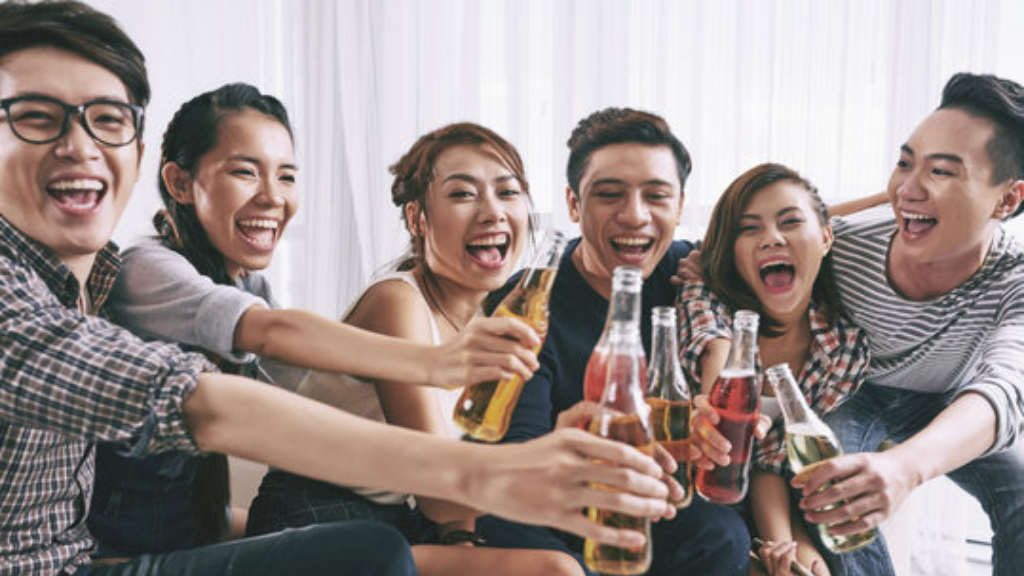
Info T1D
Tenaga Kesehatan Profesional
Tentang Kami
Alkohol dan Diabetes Tipe 1
Diedit:

Alkohol adalah obat rekreasional yang umum digunakan dan tersedia secara legal tergantung pada usia dan lokasi Anda.
Silakan periksa undang-undang setempat mengenai konsumsi alkohol dan usia legal untuk meminumnya.
Seperti obat-obatan lainnya, alkohol memiliki risiko dan dampak negatif terhadap kesehatan, kesejahteraan, dan hubungan setiap orang.
Minum terlalu banyak alkohol dapat menyebabkan pengambilan keputusan yang buruk dan membuat Anda lebih rentan.
Hubungan antara diabetes tipe 1 dan alkohol adalah Anda masih boleh minum alkohol tetapi ada risiko lebih tinggi kadar glukosa darah Anda menjadi tidak stabil.
Penting untuk mengetahui risiko-risiko ini agar Anda dapat mencegah dan menghindari situasi berbahaya.
Alkohol dapat memengaruhi kadar glukosa darah dan menyebabkan hipoglikemia.
Berbagai jenis alkohol memengaruhi gula darah dengan cara yang berbeda. Misalnya bir dan anggur manis memiliki banyak karbohidrat yang akan meningkatkan gula darah. Minuman keras (seperti wiski, vodka, dan gin) dapat menyebabkan hipoglikemia. Inilah sebabnya mengapa penting untuk mewaspadai diabetes tipe 1 dan alkohol.
Saat Anda mengkonsumsi alkohol, organ hati akan menganggap alkhohol sebagai racun yang perlu diproses. Hati biasanya melepaskan sejumlah glukosa ke dalam darah yang diimbangi oleh insulin kerja panjang yang Anda suntikkan.
Saat hati sibuk menghilangkan alkohol dari tubuh Anda, hati akan berhenti melepaskan glukosa, yang menempatkan Anda pada risiko hipoglikemia. Kadar glukosa darah akan meningkat dari kandungan gula dalam minuman beralkohol lalu kemudian turun ketika hati mulai bekerja mengolah alkohol.
Anda/teman Anda mungkin tidak menyadari tanda dan gejala hipoglikemia karena terlihat sama seperti mabuk.
Hal ini menyulitkan untuk mendeteksi hipoglikemia dan berbahaya karena Anda mungkin tidak mendapatkan bantuan yang tepat dan cepat.
Tanda dan gejala hipoglikemia dapat berupa gemetaran, berkeringat, pusing, sakit kepala, menangis, mudah tersinggung, lapar, mengantuk, kebingungan, detak jantung cepat, dan mati rasa di sekitar bibir dan jari.
Jika Anda merasakan gejala tersebut, Anda perlu memeriksa kadar glukosa darah Anda. Jika < 4mmol/L / 72 mg/dl, segera obati hipoglikemia dengan mengonsumsi makanan ringan yang ada di perlengkapan Anda.
Untuk informasi lebih lanjut tentang cara mengidentifikasi dan mengobati hipoglikemia, dapat diihat pada artikel di sini
Salah satu tips penting mengenai diabetes tipe 1 dan alkohol adalah Anda perlu memeriksa glukosa darah Anda; sebelum, selama dan setelah minum.
Karena Anda lebih berisiko mengalami hipoglikemia saat berada di luar ruangan terutama jika Anda menari atau lebih aktif dari biasanya!
"Pastikan setidaknya ada satu orang yang mengetahui bahwa Anda menyandang Diabetes Tipe 1 dan cara mengobati hipoglikemia serta mengingatkan Anda untuk memeriksa kadar glukosa darah.
Makanlah sedikit karbohidrat sebelum minum dan jangan pernah minum saat perut kosong.
Lanjutkan makan camilan berkarbohidrat setiap beberapa jam sambil minum.
Hal penting lainnya yang perlu diingat tentang diabetes tipe 1 dan alkohol adalah Anda perlu minum perlahan, mengatur kecepatan diri sendiri, dan mempertimbangkan untuk minum satu gelas air setiap meminum minuman beralkohol.
Pelajari kandungan karbohidrat dari minuman yang Anda minum.
Minuman yang telah dicampur dapat meningkatkan kadar glukosa darah Anda terlalu tinggi setelah diminum. Sebaiknya hindari minuman ini karena akan menyulitkan mengetahui kandungan gulanya.
Jangan pernah berhenti menyuntikkan Insulin.
Periksa kadar glukosa darah Anda sebelum tidur.
Makanlah camilan sebelum Anda tidur dan ingatlah bahwa tubuh terus memproses alkohol bahkan setelah Anda berhenti minum!
Sediakan 'Hypo Kit' atau terapi hipoglikemia dalam jangkauan tempat tidur Anda sehingga Anda dapat meminumnya pada malam hari jika diperlukan.
Setel alarm atau mintalah anggota keluarga untuk memeriksa kadar glukosa darah Anda di malam hari.
Tetap terhidrasi keesokan harinya dan terus pantau kadar glukosa darah Anda dan suntikkan insulin seperti biasa.
Anda tidak boleh minum alkohol jika minuman tersebut bukan pilihan Anda, atau jika Anda merasa tertekan untuk minum alkohol. Diabetes Tipe 1 dan alkohol adalah hal yang sulit untuk ditangani, jadi jika Anda dapat menghindari minum alkohol, Anda harus melakukannya.
Ketika pengendalian diabetes Anda belum terkelola dengan baik dan Anda sering mengalami naik-turun kadar glukosa darah.
Jika Anda memiliki kerusakan saraf atau kerusakan mata yang berhubungan dengan Diabetes Tipe 1.
Jika Anda kelebihan berat badan, sebaiknya hindari atau batasi alkohol.
Jangan pernah minum saat perut kosong. Selalu pastikan Anda mengonsumsi karbohidrat dalam makanan atau camilan sebelum mulai minum.
Jangan pernah minum sendirian. Ceritakan pada teman yang jelas tahu Anda memiliki Diabetes Tipe 1 agar mereka dapat mengawasi Anda selama minum alkohol.